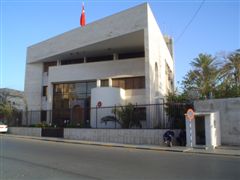France adapts its penal code to modern piracy, a necessity
(BRUXELLES2) It's not all over yet. But the bill on maritime piracy has taken a significant step, with the vote, Thursday, November 25 at first reading, in the National Assembly. Once the vote has been taken at the second reading in the Senate, which should take place quickly (*), French law will be modernized on two main points: the definition of the offense of piracy and the procedure to be followed in the event of the arrest of pirates. This responds to a legal, political and operational need.
Two main points are problematic in the current penal code
The French criminal code has, in fact, become not obsolete to combat modern piracy, especially in the Indian Ocean, but a bit outdated. Two points need to be reviewed: the definition of the offense of piracy and the procedure applicable on ships.
Concerning the definition of the offense of piracy, there is no longer a general definition since a law of December 20, 2007 (on the "simplification of law"!) which abolished the old royal law of 1825 on the safety of navigation and maritime trade which included general provisions on piracy. Thus, only residual provisions remain in the law: if the act of piracy occurs in French territorial waters (we then speak of "armed robbery at sea", which is not negligible, given the extent of overseas possessions) or if a French ship or a French citizen is attacked (we then used the offense of kidnapping, theft or hostage-taking...).
Because what poses above all a problem today for French law is the question of procedure and the translation of the Medvedyev case law of the European Court of Human Rights (1). The new law which should soon appear in the official journal (2) is thus more in line with international law of the sea and in particular the Montego Bay Convention (3).
A political and operational necessity
The increase in acts of "piracy", including in territorial waters (Somalia, Kenya...), the growing complexity of maritime transport (where there are French interests even if there are no sailors or of French flag) as well as the need to better fight against piracy, by prosecuting the pirates lead to an evolution of the law. It would indeed have been paradoxical for France to have significant French political and military involvement in the fight against piracy (in particular operation EUNavfor Atalanta and marine riflemen on board Breton tuna boats) and to retain a right limiting the prosecution of suspects.
A fairly broad scope of the piracy offense
From a point of view of legal technique, the French legislator has chosen to rely on existing offenses (hijacking of ships, kidnapping or sequestration, participation of criminals) to define the act of piracy. And the definition of the offense is now broader: geographically, it encompasses not only the high seas but also territorial waters "if permitted by international law". At the level of the time of the offence, it encompasses not only the act but also its preparation. And, at the level of the people involved, it makes it possible to apprehend not only the pirates but their accomplices.
As for the jurisdiction of the French courts, it is not "universal", for all offenses committed around the world on any boat (as permitted by the Montego Bay convention). It simply includes an additional point: "when the arrest was made by French soldiers". Thus, the French judge is therefore endowed, to use the terms of the rapporteur of the National Assembly, Christian Ménard (UMP, Finistère), with "near-universal competence".
A process that complies with human rights
At the procedural level, the law establishes a system of consignment on board of pirates, which is (more) "complies with the requirements of the ECHR". The maritime prefect must be "at once" to be informed for him to inform the Public Prosecutor. And the judge of freedoms will have to rule within 48 hours (4). An examination health suspects must be made within 24 hours of his arrest, then a medical exam within 10 days. (the use of different words corresponds to a precise difference, the health examination can be done by a nurse, the medical examination as its name suggests only by a doctor).
Finally, the text gives a legal basis to the preventive measures of "control and coercion under international law"as well as the"seizure"or the"destruction"incriminated vessels. It also allows judicial police officers and national navy officers"specially empowered" to carry out the first observations and hearings. As many "niches" of cancellation which thus disappear.
(*) Update (Friday evening): according to the latest information in my possession, the inclusion on the agenda in the Senate could intervene quickly, the government being determined that the law will be adopted before Christmas. And it should not pose any particular problem (except last minute). Because the amendments to the National Assembly are very similar to those of the Senate. The 2nd reading could therefore be considered "compliant". This would lead to an end to the legislative procedure.
(Update Wednesday 22 p.m.) The Senate effectively adopted the bill, Wednesday, December 22, in 2nd reading. The law is therefore now definitively approved.
Read also:
- Exclusive: the content of the new French anti-piracy law
- (1) The "lessons" of the Medvedyev (Winner) judgment for piracy (update)
- (2) Download here (site of the National Assembly)
- (3) Applicable law for piracy (Montego Bay and penal code)
- (4) It should be noted that this is a magistrate and not a public prosecutor, which is in accordance with the Moulin judgment of the ECHR, delivered in Strasbourg on 23 November. But that doesn't remove the whole problem, in my opinion.
- Lire: Is the new French anti-piracy law perfect?


